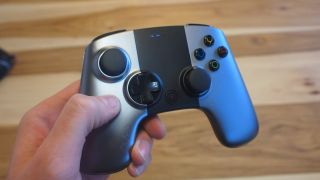New Ouya controller heading into the wild, but it's a crap shoot if you get it
Open the box and find out

It's always satisfying when a company listens to customer feedback, and in the case of Ouya, it's taken complaints about its Android console's controller to heart.
In an interview published today, Ouya CEO Julie Uhrman chatted about the improvements her company's made to the controller that TechRadar reviewer Alex Roth called laggy and low quality.
In fact, the original controller has already been phased out, and controller 2.0 will start being paired with the $99/£99 gaming device. Uhrman explained that Ouya cut down on latency and lag with the retooled peripheral, which also features more textured thumbsticks, non-sticking action buttons and tighter triggers.
"The feel of the controller today is actually probably a lot better then in June," Uhrman told Polygon.
But how will I know?
The story, however, doesn't end in a nice, neat bow.
Unfortunately, Uhrman admitted, there will be no way for customers to tell from packaging if the console they're purchasing now comes with a new or older controller.
"You wouldn't know until you bought it," she said of the controller crap shoot, but continued on to note that "every company does it, it's just that no one talks about it."
Get daily insight, inspiration and deals in your inbox
Get the hottest deals available in your inbox plus news, reviews, opinion, analysis and more from the TechRadar team.
Ouya has been replacing problem controllers when customers contact the company to complain, she said.
As for Ouya 2.0, the company will start planning for it early next year with a scheduled release for sometime in 2014, in keeping with its commitment to a yearly release cycle. No details yet on the hardware or software, but you can be sure an improved controller will be part of the package.
Michelle was previously a news editor at TechRadar, leading consumer tech news and reviews. Michelle is now a Content Strategist at Facebook. A versatile, highly effective content writer and skilled editor with a keen eye for detail, Michelle is a collaborative problem solver and covered everything from smartwatches and microprocessors to VR and self-driving cars.

